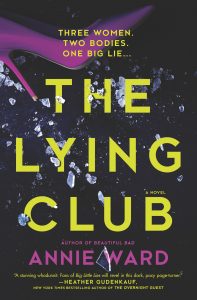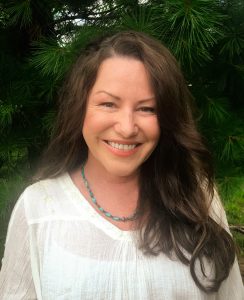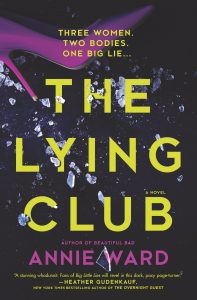Twisty suspense author Annie Ward
 If you devour twisty novels that keep you guessing and turning the pages until the very end, you’ll love Annie Ward. Her first suspense novel Beautiful Bad has been one of my go-to recommendations for readers of Mary Kubica, Lisa Unger and Lisa Jewell since it was published in 2019.
If you devour twisty novels that keep you guessing and turning the pages until the very end, you’ll love Annie Ward. Her first suspense novel Beautiful Bad has been one of my go-to recommendations for readers of Mary Kubica, Lisa Unger and Lisa Jewell since it was published in 2019.Ward’s newest novel The Lying Club is a is a revenge thriller set in an elite private school near Denver, Colorado. Step into a world of entitled families, soccer moms, obsessive romance, lies and so many secrets. The story begins with two bodies being carried away from the school. It unfolds through alternating viewpoints and police interviews. Everyone seems to have a different story. Is anyone telling the truth?
You can meet Annie Ward at the library on May 14 at 2pm in Claire’s Courtyard. She will talk about her books, writing and inspiration. Bring your questions. We'll also have a book signing.
Conversation with Ward
The Lying Club
I asked Ward why readers should move The Lying Club to the top of their to-read lists.
“Sex, drugs and sports!” Ward said. “For those who enjoy reading a racy tabloid or watching a shocking true crime documentary, this book will tick those boxes.”
Interest in thrillers
Ward is an avid reader and fan of thrillers. As a child she had a love for Nancy Drew, then she moved on to Stephen King. In college she adored The Secret History by Donna Tartt.
“I suppose my interest in that mixture of puzzle mysteries and bloody, gory horror was an early indication that I would be drawn to dark stories containing mysteries and murder,” Ward said.
Her interest in thrillers was reignited when she read a book that took the publishing world by storm—Gone Girl by Gillian Flynn.
“I developed an appetite for unreliable narrators and decided to try my hand at it,” Ward said. “The result was Beautiful Bad.”
 Research
Research
Ward tends to write what she knows, but with a twist. Beautiful Bad started with her experience falling in love with a former soldier suffering from PTSD. The Lying Club draws on her experiences as a high school and college athlete, a soccer coach for a private school and a soccer mom. However, her books still involve research.
“…ll day every day I'm researching little things like architectural elements, types of trees and flowers, fashion designers or even street names in various cities,” Ward said. “If I'm really stumped, I go farther. For example, for The Lying Club I spent a lot of time on the road driving from Kansas City to Colorado to spend time in the little resort towns to get the feeling right for the fictional location of my mountain private school.”
Wards reading recommendations
Ward also reads like crazy, in every spare moment. It’s a great way to stay entertained and enjoy life even while waiting. It’s also one of the best ways to learn how to write suspense that other readers will enjoy.
“ead suspense and thrillers to understand how those intricate plots are crafted,” Ward said. “Every time you gasp with surprise, consider how the author managed to shock and fool you. I can't tell you how many times I've been reading a book and been blown away by a brilliant twist that I'm sure I could never have come up with, only to later realize that it inspired me and improved my own writing.”
Benefits of the library
Thank goodness for the library, right? Suspense readers go through a lot of books, and very quickly, because you just can’t put them down. For Ward the library holds wonderful memories of childhood reading, and it has also been a welcoming place to write.
“Libraries have always been a place where I could feel safe, content, and let my imagination run free,” Ward said. “And, if it weren't for the Blue Valley branch of the Johnson County Library, I'm not sure how I would have written Beautiful Bad. At the time I started the book, I was a stay-at-home mom with two children under two. The only way I could write was to have a sitter come to my house for a few hours in the afternoon while they napped, and then drive to the library with my laptop. There was a sunny table by a big window. It was quiet and I was surrounded by books.”
Pick up The Lying Club from your library and clear your schedule—you’re not going to want to put this book down. Ward shared a list of recommendations for our summer reading lists, too. Check them out below, then read on for our full interview with the author.
Full Interview with Annie Ward
I loved your first suspense novel Beautiful Bad! It's twisty and un-putdown-able, with memorable characters. What drew you to writing suspense? Are you a reader and fan of the genre?
Growing up, I went through a Nancy Drew phase that lasted several years until I discovered Stephen King. I suppose my interest in that mixture of puzzle mysteries and bloody, gory horror was an early indication that I would be drawn to dark stories containing mysteries and murder. As an English major at UCLA, I gravitated more towards literary women's fiction. That genre would remain my staple for a decade, but my favorite book from those years was The Secret History by Donna Tartt, which in retrospect I think falls into the category of literary psychological thriller. I realize it sounds cliche at this point, but my interest in thrillers reemerged in my thirties after reading Gone Girl by Gillian Flynn. I developed an appetite for unreliable narrators and decided to try my hand at it. The result was Beautiful Bad.
Your new novel, The Lying Club, is a revenge thriller set in an elite private school, where two people are murdered. I’m sold! If people need more convincing to add this to their lists, what would you tell them to sweeten the pot?
Sex, drugs and sports! A little bit of something for everyone, when you throw in the tension between husbands, wives and daughters, coaches and athletes and ambitious soccer moms. Some readers may find it interesting to get a sneaky peek into the world of private school employees and learn about their true feelings towards the entitled families they serve. Others might relate to the depiction of a passionate but doomed relationship. For those who enjoy reading a racy tabloid or watching a shocking true crime documentary, this book will tick those boxes too.
Do you do research for your novels?
The answer is yes, but possibly not the kind of research a lot of people might expect that writers do. I tend to write what I know, not because I think that's necessarily the best way to write but because it's what works for me personally. For that reason, I usually have a pretty comprehensive knowledge of my subject matter. All of my books are at least loosely based on different chapters in my life. The Making of June was about the time I spent living in Bulgaria in the nineties. Beautiful Bad was based on my experience of falling in love with an ex-soldier suffering from PTSD.
The Lying Club combines three parts of my life: being a high school and college athlete, coaching soccer at a private school and eventually becoming a "soccer mom" myself. However, all day every day I'm researching little things like architectural elements, types of trees and flowers, fashion designers or even street names in various cities. If I'm really stumped, I go farther. For example, for The Lying Club I spent a lot of time on the road driving from Kansas City to Colorado to spend time in the little resort towns to get the feeling right for the fictional location of my mountain private school. I don't have to do the kind of research writers of historical fiction have to do, about weapons, wars, Presidents, spies and the like. One day I would like to, but it hasn't happened yet.
Of course I must ask, are you a fan of libraries? Have libraries had an influence on your life or writing?
Both. My dad was a more avid reader than my mom, but she was the one who took me to the library on the weekends with a list of titles that he'd asked us to check out. Even after I could read myself, he continued to read aloud to me, and I always had a stack of library books on the toy box that sat underneath the window in my bedroom. At that time, we lived in a somewhat rural area of Kansas and the drive to the library was 30 minutes. I remember feeling impatient and excited to get there and walk the aisles with my mom and our new reading list. Those were happy times.
And, if it weren't for the Blue Valley branch of the Johnson County Library, I'm not sure how I would have written Beautiful Bad. At the time I started the book I was a stay-at-home mom with two children under two. The only way I could write was to have a sitter come to my house for a few hours in the afternoon while they napped, and then drive to the library with my laptop. There was a sunny table by a big window. It was quiet and I was surrounded by books. Libraries have always been a place where I could feel safe, content, and let my imagination run free.
If you could share one tip with an aspiring writer of suspense and thrillers, what would you say?
I would tell them to read. Read all the time. Play an audio book when you commute, travel, or even just are folding laundry. Keep a book handy, in your car or purse for when you're waiting on soccer practice to end, or for the doctor to see you. I even used to take a book to the gym with me and would sit cross-legged on the floor of the aerobics studio and read until the class started. I'm sure some people thought I was nuts, but I didn't care.
You never have to waste a minute of your life if you have a book to read. Moreover, read suspense and thrillers to understand how those intricate plots are crafted. Every time you gasp with surprise, consider how the author managed to shock and fool you. I can't tell you how many times I've been reading a book and been blown away by a brilliant twist that I'm sure I could never have come up with, only to later realize that it inspired me and improved my own writing.
What’s next for you? Are you at work on your next novel?
I'm in the early stages of my next novel, which is tentatively titled The Conservatory. Like all my books up to this point, it's loosely based on a chapter of my own life. I went to an extremely cut-throat and competitive film school in Los Angeles in the '90s and I've always thought it would be a great setting for an ensemble murder mystery with psychological thriller elements. As I usually do, I'll start with the true story, then make up a few characters with hidden obsessions and motives, and lastly figure out a way to kill a couple of people off in a dreadful way. It’s cathartic and quite frankly, an awful lot of fun.












